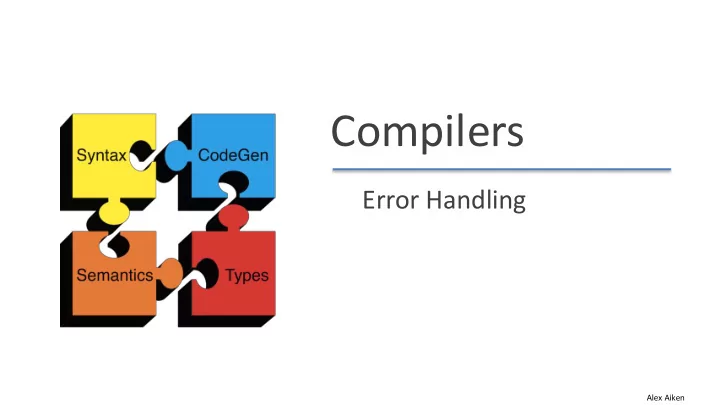

Compilers Error Handling Alex Aiken
Error Handling • Purpose of the compiler is – To detect non-valid programs – To translate the valid ones • Many kinds of possible errors (e.g. in C) Error kind Example Detected by … Lexical … $ … Lexer Syntax … x *% … Parser Semantic … int x; y = x(3); … Type checker Correctness your favorite program Tester/User Alex Aiken
Error Handling • Error handler should – Report errors accurately and clearly – Recover from an error quickly – Not slow down compilation of valid code Alex Aiken
Error Handling • Panic mode • Error productions • Automatic local or global correction Alex Aiken
Error Handling • Panic mode is simplest, most popular method • When an error is detected: – Discard tokens until one with a clear role is found – Continue from there • Looking for synchronizing tokens – Typically the statement or expression terminators Alex Aiken
Error Handling • Consider the erroneous expression (1 + + 2) + 3 • Panic-mode recovery: – Skip ahead to next integer and then continue • Bison: use the special terminal error to describe how much input to skip E int | E + E | ( E ) | error int | ( error ) Alex Aiken
Error Handling • Error productions – specify known common mistakes in the grammar • Example: – Write 5 x instead of 5 * x – Add the production E … | E E • Disadvantage – Complicates the grammar Alex Aiken
Error Handling • Idea: find a correct “nearby” program – Try token insertions and deletions – Exhaustive search • Disadvantages: – Hard to implement – Slows down parsing of correct programs – “Nearby” is not necessarily “the intended” program Alex Aiken
Error Handling • Past – Slow recompilation cycle (even once a day) – Find as many errors in one cycle as possible • Present – Quick recompilation cycle – Users tend to correct one error/cycle – Complex error recovery is less compelling Alex Aiken
Recommend
More recommend